Payal Dhar's Blog: Writer's Log
December 25, 2020
Learning to suck, learning to live
Earlier this year, for the first time in my life, I dipped my toes into baking seriously. I bought an oven, stocked up on dark cooking chocolate (for what is cake without chocolate?), researched recipes, measured my dishes, and rolled up my sleeves. The first few attempts ranged from the ordinary to outright disasters. (Those indestructible silicone baking moulds? They are not so indestructible after all.) Every burnt cake top, every lump of muffin hard enough to knock out a human being, every bottom layer of uncooked batter were my worst fears coming true: I sucked; I should have never embarked on this fruitless endeavour; bakeries existed for a reason.
Every minor disaster was another nail my baker’s coffin, and it effectively negated every item that came out of my oven in decent condition. At that point, unbeknowst to me, I was reacting to having grown up in a culture that teaches you that only what you’re good at counts.
The pandemic was still raging, I think it was August, when I read an article about being raised in an environment that glorifies achievement and achievement only (sorry, forgot to save the link). The story was in an American context, but there were some sharp similarities with middle-class Indian sensibilities, particularly for families with cultural capital where the motto is, be the best or be damned. I grew up in such a background. There was immense pressure to excel (and concommitant rewards) with the understanding that everything I do, I have to do well. As a result, I, and my contemporaries, grew up conflating achievement with enjoyment.
*
This has been a year of devastations and discoveries for all of us, and I’ve learnt and lost, succeeded and failed in bucketfuls just like anyone else. But the one thing that stands out is something I wish someone had told me when I was five years old—that being good at something isn’t the point of doing it; the point of doing something is, well, just doing it.
This conflation of “doing” and “succeeding” is so deeply internalised that most of us don’t even realise it. In my baking adventures, friends and family were all unanimously supportive, and I appreciate that support. It buoyed me, made me believe that some day I would be good at this, and kept me going.
But what I forgot to ask myself—or even knew that it could be asked—was: Am I having fun? Am I enjoying it?
I was! I baked when the rest of the world was asleep. I baked when I wanted something special. I baked because I’d met a challenging deadline. Plus, I baked when anxiety overwhelmed me. I baked when I was so burnt out that I couldn’t work and couldn’t sleep. I baked when I wondered if we were all dying of COVID-19.
And I wondered about all those pursuits I’d abandoned because I wasn’t any good at them and therefore considered them unworthy of my time. When I’d let the absence of automatic excellence define what I could (should?) enjoy.
*
Perfectionism is ruining our lives. It is a delusion, a false belief, a misconception, and it is holding us back. When we learn to embrace perfectionism at a young age, it traps us and subjugates us. According to professor and author Brené Brown:
Perfectionism is not the path that leads us to our gifts and to our sense of purpose; it’s the hazardous detour.
Brené Brown, https://brenebrown.com/
Author Kurt Vonnegut calls our hang-up about being perfect the “myth of talent”, and it comes from living in a culture of achievement that only values you for the things that can be quantified as a success. Here’s the full quote that made the final pieces fall into place for me:
When I was 15 I spent a month working on an archeological dig. I was talking to one of the archeologists one day during our lunch break and he asked those kinds of “getting to know you” questions you ask young people: Do you play sports? What’s your favorite subject? And I told him, no I don’t play any sports. I do theater, I’m in choir, I play the violin and piano, I used to take art classes. And he went WOW. That’s amazing! And I said, “Oh no, but I’m not any good at ANY of them.”
And he said something then that I will never forget and which absolutely blew my mind because no one had ever said anything like it to me before: “I don’t think being good at things is the point of doing them. I think you’ve got all these wonderful experiences with different skills, and that all teaches you things and makes you an interesting person, no matter how well you do them.” And that honestly changed my life. Because I went from a failure, someone who hadn’t been talented enough at anything to excel, to someone who did things because I enjoyed them. I had been raised in such an achievement-oriented environment, so inundated with the myth of talent, that I thought it was only worth doing things if you could “win” at them.
Kurt Vonnegut, https://www.boredpanda.com/being-good-at-things-quote-kurt-vonnegut/
Unravelling a lifetime’s worth of socialisation takes more than just flipping a switch. But when the switch is flipped, everything is bathed in a new light. I think about this every time I lace up my new roller skates, and I ask myself the only question that matters: Am I enjoying this new pursuit? Am I having fun?
~PD
(Image credit: Photo by Brit Brodeur from FreeImages)
September 19, 2020
The terrible tropes of YA fiction
What are some of your pet peeves in YA fiction? The kind of things that make you groan aloud? If you’re an author, which of these have you been guilty of, or used with the intention of subverting it? If you’re a reader, which one do you secretly loooove? Or do you have an example of a book that turns a trope on its head?
I’ll start!
Instalove: Yes, I know, this one is apparently a teen favourite, and a staple in the romance genre for all ages, but this idea that you see someone and fall in love instantly, that too the kind of love that you risk life, limb, kingdom, planet, and universe for? Um, no, sorry, not buying it. “Love” is a complex emotion; cannot happen instantly. What is really going on is “instalust”. Now that is very much possible and I would buy it, particularly because adolescents are very prone to instalust. Not guilty for this one, thank heavens.
Letting out a breath you didn’t know you were holding: It is well known in the world of teen fiction that protagonists are given to holding their breath without knowing, at least not until they exhale (or die, I imagine, though I’ve never come across any such example). Anyway, I can’t get too sniffy about this one. We’ve all done it, and I plead guilty. But I promise, NEVER AGAIN! Deep breaths everyone.
Adolescents who talk like grown-ups: No, scratch that, adolescents who talk like annoying, know-it-all grown-ups, the kind that use a multisyllable word where a hmm will do. If you want to know what I mean, read any book of John Green’s. Keep all those deep, philosophical conversations out of my entertainment, please! Not guilty—bloody well hope not, at least, since I’m way too shallow for all that nonsense.
Adolescents who talk like what adults think they talk like: This is actually a spectrum, and depends on where the author stands. On the one hand you have the extremely prim, holier-than-thou, Blyton-esque types who mind their P and Qs, and never utter a four-letter word. This is possibly what parents hope their children talk like. On the other is the whole dude-bro, like, yo, whassup, CU L8r speech, usually done an author who hasn’t been a teen in a very long time. (Extra points if you’re an Indian writer who’s used “swag” to mean “swagger”). I really, really hope NOT guilty for this one! (If I am, please tell me, somebody!)
The bad boy who takes control: Colin Firth is delicious (yes, I know, I know, but I’m not blind); Mr Darcy, however, is not. (Unless he is Colin Firth in a wet, white shirt.) The brooding, angry, misunderstood man/boy who women/girls secretly find irrestible is a trope that is inexplicable to me. What’s worse is when this is in the form of a smirky boy who “takes control” by undermining a capable girl, and she completely falls for it (and him). Where’s the vomit emoji when you need it? (For more insights, do check out @broodingYAhero.) Not guilty, mainly because cishet romance is yawn (and mostly baffling to me).
Love triangles: If you’re sensing a theme here, congratulations, you’re not completely off the mark. Romance in YA has usually been very badly done, rife with tropes like instalove, enemies to lovers, impossible love triangles, and so on. Unsure if I’m guilty or not, as one of my works-in-progress has a love triangle that I’m hoping subverts the trope.
Adolescents saving the universe: This is a funny one. I completely believe that young people can and do change worlds. It’s when they do it in impossible, improbable, and over-simplified ways that it gets my goat. Like, pivotal decisions based on “true love”. I just read a lovely book from NetGalley that is coming out in September that had this issue. The entire plot—which was in itself pretty good, with a magnificent twist—hinged on a couple of teenagers having the hots for each other. Other than that, teenagers mounting a rebellion and overthrowing tyrants by infiltrating the latters’ inner worlds or hacking something or the other—not buying it. But then, you’d probably say I’m guilty in this regard, so I’ll try to be less judge-y.
The queer best friend and other tokenisms: The les-bi-gay-trans best friend is becoming more and more of a thing these days, and I can recall at least one ghastly YA where a gay boy was toaster-oven-ed into falling for the girl protagonist. Oh. My. F-ing. Gawd. NO! But again, I’m guilty of at least one gay-best-friend story, I think I’ll just shut up now.
~PD
(Image credit: Image by PublicDomainArchive from Pixabay)
September 2, 2020
Yes, you deserve to be paid!
We are somehow conditioned to believe that asking for money is a sordid undertaking. As authors, illustrators and storytellers, this means that when we get invited to events as resource people—guest speaker, workshop facilitator, expert speaker, competition judge, awards juror, or simply as an entertainer—we hesitate to ask for money.
Even though writing (that is, writing fiction for children and young adults in India) is a labour of love for most of us, it does not mean that schools, festivals, online events and so on have a right to benefit from it. Would a literary festival ask the tent people to work for free, or the caterers? Would a webinar demand free internet access? Why then is the very content that makes these events what they are not valued?
Having been a freelancer for almost a quarter of a century, asking for money or negotiating is second nature for me. I know how to say “Where should I send my invoice?” in all 22 national languages. (No, not really, but I can make myself clear.) However, negotiating with editors and publishers is one thing; asking “How much?” when someone invites you to a webinar or a literary festival is quite something else.
Actually, it’s not. We just think it is. And it needs to stop.
Recently, authors and illustrators in India are attempting to get organised and develop a set of best practices for school visits and other events. Meanwhile, here are some of the things I’ve learnt over the years:
Vouchers are not payment: We all love book vouchers and boxes of cookies and chocolates, but these are gifts, not payments. If you’ve asked for or been offered payment, then vouchers and gifts cannot stand in for cold, hard cash.
Taking care of your transport and accommodation is not a replacement for payment: Any payment has to be in addition to any actuals incurred. The orginizer should either be reimbursing you (be ready to produce bills) or picking up the tab directly. To avoid nasty surprises, check beforehand.
“But others are doing it for free” is no reason you have to: Just because they are, doesn’t mean this practice is right, or that you need to do the same. It is, however, fine to enter into an agreement where you know at the outset that your participation or contribution will be voluntary. What is not fine is for an organizer to use this argument as an emotional blackmail tactic, and guilt you into not being paid.
Events that are ticketed or open to paying members MUST pay: This is self-explanatory. There is no other side to this. Any organizer who doesn’t do this is exploiting you. Stop it now.
It doesn’t mean you can’t help a friend or your alma mater or a good cause: To reiterate, there are many occasions when doing a pro bono session is perfectly okay. It is also absolutely fine for you to decide to forego payment at any time. What is not okay is unpaid creative labour being the norm or to be expected to do it for a bunch of flowers and chai–samosa.
Storytelling, the arts, creativity—all these are essential for human existence. We’ve always told and shared stories, and we always will. Therefore, the experiences, expertise, advice, entertainment that all of us—authors, illustrators, other kinds of storytellers—have to offer are priceless. Event organizers are the (essential) go-betweens that help our stories reach readers or listeners. But they cannot take us for granted or disrespect our time and our work.
Still not convinced? Or convinced but not confident enough? Get in touch through the comment form below, and I will be happy to coach you. Yes, I fully expect to be paid—in desserts, with chocolate in them.
~PD
July 24, 2020
Change
There have been lots of thoughts and feelings about this year, not just from me in particular, but because…well, we’re in the middle of a global crisis that makes every disaster movie you ever watched feel a little bit too familiar. Yet it’s been well over six months since I’ve written anything here. That’s half a year of blog coma. Quite bizarre when I have so many words that I feel I’m bursting.
When it started, 2020 seemed like it would be an unforgettable year. Guess it will be, but not in the way anyone imagined. The incandescent hope spilling out into the lanes and streets of Shaheen Bagh that freezing January night, the pulsing crowd of women who were making history, that feeling of connectedness in the roar of slogans calling for the end of the citizenship act, the songs, the pack of Good Day biscuits…
No, I wasn’t going to say they don’t seem real any more. They do; they are. But a lot has happened since then, a pogrom and a pandemic. And the change that started when I entered my first protest in December continuted through both these events. I don’t yet know what, but there are some things you don’t come out of without losing bits of yourself or finding parts that you never knew existed.
~PD
January 27, 2020
Some birthday brooding
In the mid-1970s, in the dead of winter, despite advice to the contrary, my mother went see a night show of Rosemary’s Baby. I’ve never got around to asking her if she did manage to watch the whole thing—I tend to get distracted by that part of the story where, being nine months pregnant, she went into labour, and some 16 hours later, out I popped.
It was probably a fitting movie, for I’m willing to bet that recalcitrant little me felt like the devil incarnate to my 20-year-old mother. Forty-four years later, and somewhat larger in size, I guess I still do. The apple didn’t fall far from the tree.
Anyhow, to skip to the spoiler, I don’t think I have any satanic tendencies. Unless you count having a decent year despite the impending climate catastrophe and fascism taking over our world.
Let’s see how I did with my goals for 2019:
Finish writing one book and submit to a publisher: DONE. Although I’ve got stuck in another round of revisions, so a full submission is yet to happen. On the bright side, a publisher has shown some interest.Stay fit and in good health: DONE. Hope to continue with more of the same.Pitch more freelance stories; get into a dream publication: DONE. I pitched more than 150 stories in 2019; met my $1+/word assignment target; and got a commission from a dream pub.Blog more regularly: DONE. Not as much as I’d have liked, but it’s in improvement.Visit Japan: Does Thailand count?Find time for gaming: MAYBE. I’m going to give myself half a point for this one.
That makes a total of 4.5/6, one of my best in recent years. I’ll take that as a good sign for the decade to come.
So, rolling ahead with the optimism, here’s what I want to achieve in 2020:
Finish another book, preferably fantasy, but I’ll take anythingDraw moreDo more crochetTravel (Bangalore doesn’t count)Stay more politically engaged (in whatever way)
How does that sound?
Hmm. #HumDekhenge in 2021.
(Image by markgregson from Pixabay)
January 6, 2020
Five-star YA reads of 2019
The one good thing about 2019, was that it was a fantastic reading year. This was mainly thanks to NetGalley letting me read pre-publication proofs in exchange for reviews. Of course, there were good and bad books—including that eminently forgettable whodunit in which the only gay character was also the deranged killer—and also very unremarkable books. But there was also some outstanding YA.
Girls with Sharp Sticks (Suzanne Young)
This utterly fascinating, fantastic and disturbing YA dystopian fantasy is set in the not-so-far future. Or maybe it is already a reality. The picture-perfect girls of Innovations Academy are being groomed to be the best young women that society can showcase—demure, obedient, pliable, and most of all, beautiful. They live strictly disciplined lives under the supervision of their Guardians. Until one day, Philomena meets an outsider who upsets her carefully controlled existence and makes her question everything she and her friends have taken for granted. Through this uncomfortable and yet extremely uplifting story, Suzanne Young asks subtle and troubling questions about gender roles in society.
The writing is good, tension is perfect; and for a change the climax is not a let down. If I had a criticism, it would be that Philomena’s self-awareness might have come too easily given that she didn’t really know anything different. Anyway, this book should be a compulsory read for young girls, boys, and everyone else, to understand a great deal about how gender plays out in our world. Actually, a great many adults would benefit from it too.
A highly recommended read for today’s adolescents. If you enjoyed Louse O’Neill’s Only Ever Yours, you’ll love this.
A Danger to Herself and Others (Alyssa B. Sheinmel)
There are many good contemporary YA novels tackling mental health-related themes, but this is one of the best I’ve read.
Told from the perspective of teenager Hannah, who has been sectioned after an incident at her summer school, the unveiling of the plot was twisty and delicious. Hannah’s relationship with her new therapist and her roommate, her baby steps to getting her life back…it all came together in a series of shocking revelations.
The author hits the protagonist’s voice perfectly, particularly her disdain towards the staff at the hospital, and her complete confidence that she can out-manipulate them to her own end. It’s difficult to say too much about the plot without hinting at spoilers, so all I’ll say is, READ IT!
~PD
Nos.14&15 of #52Stories: 5-star YA reads of 2019
The one good thing about 2019, was that it was a fantastic reading year. This was mainly thanks to NetGalley letting me read pre-publication proofs in exchange for reviews. Of course, there were good and bad books—including that eminently forgettable whodunit in which the only gay character was also the deranged killer—and also very unremarkable books. But there was also some outstanding YA.
Girls with Sharp Sticks (Suzanne Young)
This utterly fascinating, fantastic and disturbing YA dystopian fantasy is set in the not-so-far future. Or maybe it is already a reality. The picture-perfect girls of Innovations Academy are being groomed to be the best young women that society can showcase—demure, obedient, pliable, and most of all, beautiful. They live strictly disciplined lives under the supervision of their Guardians. Until one day, Philomena meets an outsider who upsets her carefully controlled existence and makes her question everything she and her friends have taken for granted. Through this uncomfortable and yet extremely uplifting story, Suzanne Young asks subtle and troubling questions about gender roles in society.
The writing is good, tension is perfect; and for a change the climax is not a let down. If I had a criticism, it would be that Philomena’s self-awareness might have come too easily given that she didn’t really know anything different. Anyway, this book should be a compulsory read for young girls, boys, and everyone else, to understand a great deal about how gender plays out in our world. Actually, a great many adults would benefit from it too.
A highly recommended read for today’s adolescents. If you enjoyed Louse O’Neill’s Only Ever Yours, you’ll love this.
A Danger to Herself and Others (Alyssa B. Sheinmel)
There are many good contemporary YA novels tackling mental health-related themes, but this is one of the best I’ve read.
Told from the perspective of teenager Hannah, who has been sectioned after an incident at her summer school, the unveiling of the plot was twisty and delicious. Hannah’s relationship with her new therapist and her roommate, her baby steps to getting her life back…it all came together in a series of shocking revelations.
The author hits the protagonist’s voice perfectly, particularly her disdain towards the staff at the hospital, and her complete confidence that she can out-manipulate them to her own end. It’s difficult to say too much about the plot without hinting at spoilers, so all I’ll say is, READ IT!
~PD
December 30, 2019
2019: A year in solidarity
Twenty nineteen was a crappy year. Right-wing hate spread its tentacles deeper and wider around the world—the BJP was elected back in power; we lost some good people—some died, some showed their true colours; the economy got worse; Kashmir was annexed by the BJP government; and the climate crisis got worse. There’s more, but I wouldn’t want to depress anyone before their NYE parties.
Let’s cut to the chase: despite all the persistent gloom, I’m calling 2019 the year of solidarity. In particular, I refer to two very disparate examples: the #Berena fandom that came together to force the Holby City production team on the back foot, and the Indian public that found its spine and we are now challenging a government that’s questioning our citizenship.
Some would say that these two things are not comparable. That one is a social and political national issue that affects millions, and the other is just a story in a television soap watched by a fraction of that number. That is not my point, though. My point is, that at some very dark moments in two completely different context, people came together to call out the bullshit of others who had more power than they did; who broke promises, cheated, and spread hatred.
For me, the year started in a sort of Berena-breakup fugue. Many of us were flabbergasted at the haphazard ending of Holby City‘s once-acclaimed lesbian pairing, and the disregard of promises of representation and respect. But more than that, none of us were able to predict or even understand why it affected us in such a disproportionate (seen with a “neutral” eye) manner. Nor did we foresee the lasting mental health repercussions that many fellow-fans suffered. Oh, and of course, we had no idea that the story was going to get worse.
In that muddle of grief and rage, we still came together to form Berena Deserved Better, an online campaign to hold showmakers accountable for their promises of representation. We sent an open letter to the BBC (which was acknowledged on paper, but ignored in deed), campaigned hard on social media to try and pin the powers-that-be down to their promises, and were betrayed by various people we thought were allies (I’m looking at you, Catherine Russell, Heather Peace and Diva magazine).
BDB fractured eventually, pulled in different directions, but if the kneejerk storytelling of Holby City this year was anything to go by, we definitely rattled them. They were unable to own up to their mistakes or learn from them, and in a series of malicious moves attempted to teach us—BDB, and other Berena fans—a lesson. Needless to say, there were no winners.
Moving to a completely different canvas. India’s new citizenship act is the latest in a spate of hate-mongering, Islamophobic moves by the state. The governing party BJP has always had an agendy of turning India into a Hindu state, and the steady move towards authoritarianism has been witness to that. But now, we’ve had enough.
The women of Shaheen Bagh in Delhi, braving temperatures of 1 and 2 ºCelcius (the coldest winter in decades), have been protesting 24×7 since 15 December. Indian Muslims, particularly women, have been at the forefront of the current uprising of Indians reclaiming our democracy, our right to self-representation, all done in a peaceful, dignified manner. Braving some of the worst state-sanctioned violence against its people, particularly in Uttar Pradesh.
On the last two days of 2019, I want to say thank you to all the women with whom I walked this year. Some of you are now my friends—you know who you are—some of us didn’t see eye to eye and went our separate ways. But know this—I am grateful for your support and solidarity, irrespective of the outcome. The most important wars are fought on many fronts, and even in our separate smaller battles, we will be working to the same end.
Thank you for the solidarity, sisters!
~PD
November 4, 2019
An open letter to Catherine Russell
Dear Catherine,
Now that the news is out that you’re leaving Holby City, I find myself thinking back on all the drama that happened in relation to the Berena story. I know I’m not the only one, but I speak here for myself only.
I used to believe you when you said you were an ally. I believed you when you took up the microphone time and again, and promised that you got it. That you took cognisance of the importance of the Berena story that you were portraying, that it was about time these stories became mainstream, and that you were going to treat it with the respect that it deserved but had not received historically. When you said, “If your world is telling you that you’re not approved of…that’s tough,” and you spoke of “meeting quite a lot of very young women who have come out…because of Holby City,” you sounded so very convincing.
You were so believable that you fooled a lot of us. You are undoubtedly a good actor, but if your social-media actions of the past year are anything to go by, you are not an ally of LGBTQ+ people. And I’m calling your out on your false promises and some outright lies.
You were propelled into the limelight by the adulation and admiration of the Berena fans, and you were happy to bask in it. But when we held you to account for your misleading promises, and when we levelled criticism at the direction of the story, you were quick to distance yourself from us. You not just dismissed our protests, but you played into a narrative of fans being abusive when they criticised you; then you highlighted—numerous times—the fact that you mute and block voices you don’t want to hear, encouraging others to do the same. In fact, some would say that your actions exacerbated the rift in the Berena fandom.
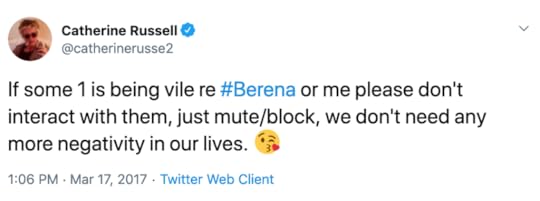
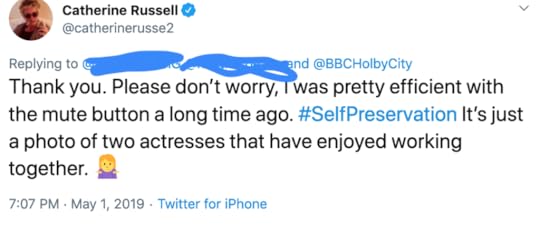

When you said that you cared about representation, both of lesbians and lesbians “of a certain age”, you were so believable that I ignored all the little signs that were telling me to be circumspect. When people around me pointed out that you were a straight woman, an actor, who by her own admission lives in a bubble, so could she really understand, I still chose to continue to believe you. Again and again, you kissed Jemma Redgrave and I believed it—except one instance, but we’ll put that down to a bad take. I believed you again when you said, “It’s amazing the power of that little box in your sitting room.” Indeed. The stories we see and hear about people who are different from us form our idea of what the world is like. As a Twitter friend of mine, a fellow-Berena, said, “The way choices are rewarded and punished is how our culture teaches us what to expect in our own lives. Narratives can sustain or destroy our ability to hope.”

You fanned our hopes for years, but when they were destroyed, you turned around and walked away. Not just that, you dismissed us, implied we were all immature, abusive, unpleasant; you publicly stated, more than once, that you choose not to hear us. Do you honestly not see the irony and the injustice of that? Of you, a straight woman and a self-declared ally, shutting down queer voices? Do you really think you can tell them, from your position of privilege, that they are wrong in how they feel about a story that purports to represent their lives, how they interpret it?

The funny thing is, you claim that some of us are unable to distinguish between actor and character. But it is your Twitter bio that says, “Awesome Lesbian Surgeon,” when you (the actor) are none of these things. For me, what stings the most is that you have been more than forthcoming to take the numerous metaphoric curtain calls, the Twitter version at least, when everything was right with Berena, when it was actually a groundbreaking story. But when the story fell into tropes and stereotypes, you had “We just say the dickies” on copy/paste. You went up on stage and accepted a Diva Award for a storyline that you knew was going to be thrown out with the rubbish—that was accidental, I promise—before the year was out.
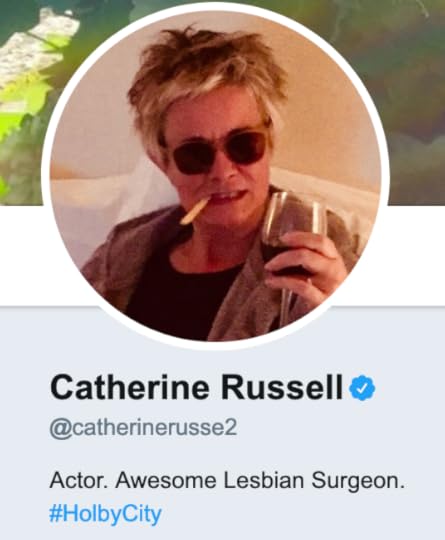
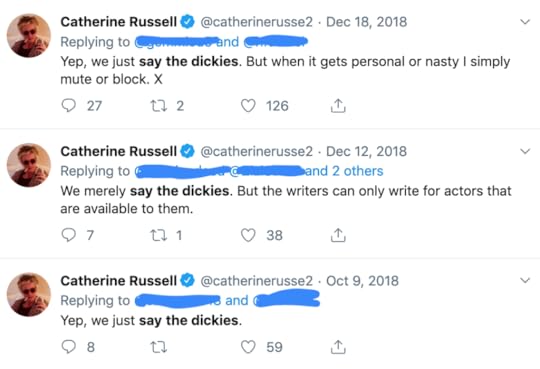
You are just an actor and you are not responsible for story lines, right? So you’ve said. But you’ve also said that the slow-burn romance between Serena and Bernie was unscripted, that it was down to you and Jemma Redgrave how you played it. Then, during your GoSober campaign last October, you mentioned that you’d been pushing for the menopause storyline. So which one is it? Are you able to influence your own stories or are you not? Also, why should we believe you?
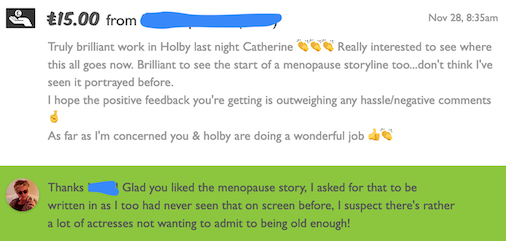
You chose to be the poster-woman for older lesbian representation—it wasn’t your job, but you still chose to do it. If you hadn’t, we wouldn’t be here today and I would have only known you as that brilliant actor who played Serena Campbell. You could have simply smiled and said “thank you” for Berena-related praise, but didn’t; instead, you promised us things that were never yours to promise, and then sulked because we called you out when you couldn’t deliver.
You have surrounded yourself with fans who sing your praises, who hang on your every word; you encourage them in their hate; and you actively advocate blocking and muting of marginalised voices. You have gone looking for tweets about Serena Campbell that don’t tag or mention you, and have blocked their writers. You have shown yourself to be a fair-weather ally, whose understanding of identity, representation, and appropriation are distinctly lacking, and someone who gets snippy if anyone points that out.
I submit that your actions have been ignorant, arrogant, manipulative, and cowardly. You sequester yourself in an echo chamber of admiring voices, and amplify the narrative that those who are upset with your actions of the past seven months are juvenile and delusional at best, and abusive and dangerous at worst. Using harmful tropes and stereotypes are not drama—what they are is ridiculing the hard-fought everyday battles that many of us grapple with; dismissing the invisibility, hate, and sometimes outright violence that are part of our lives.
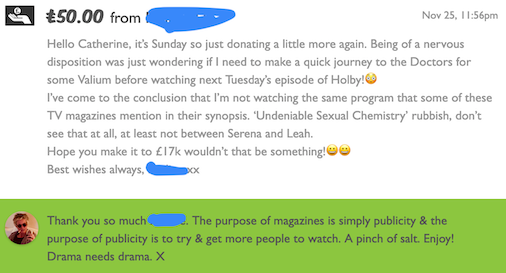

There is very little you can do to regain the respect of the past unless you listen to your entire body of fans and ex-fans, and not just the fawning few, tender a full and unqualified apology for your appalling social-media behaviour, admit that you are woefully ignorant of what what being an ally to sexual minorities means, and allow yourself to be educated to correct that. Of course, there is no force in this universe that can force you to do any of that—it’s your choice.
So, which one is it going to be? Will you redeem yourself and join us in this fight, or let us forget you as an inconsequential squeal in the larger battle for visibility and representation.
Yours disillusioned-ly,
A former fan
~PD
(Header image by Greg Montani from Pixabay)
October 28, 2019
Thai Diaries (days 9, 10 & 11)
So on now to the last leg of my trip, the holiday part of it at least, in Bangkok. This was my second time in the Thai capital and I was amazed at how much I missed the last time! Or perhaps travelling solo just gives you a different perspective anyway.
I arrived at Suvarnabhumi airport from Chiang Rai in the evening, the flight about an hour late, mentally reciting the way to my hotel in Chinatown. The Airport City Link to Makkasan, change to the MRT, go to Wat Mangkon. So far, so good. But the tricky part always is to figure out which way to get out so as to have the shortest and cleanest way to your destination. With 15 kg of baggage and a pulled deltoid muscle to spice it all up.
Anyhow, the MRT security guards soon guided me (albeit not very confidently!) to the correct exit, from where a 10-minute walk took me to my hotel. In a somewhat seedy corner of Chinatown, but the hotel itself turned out to be good.
The next day, braving heat and humidity, I set off for Chatuchak, Bangkok’s famous weekend market. I had purposely planned to go there and the to gigantic ICONSIAM across the river. My motive was two-fold—AC and river crossing. It was also an interesting contrast, from the buzzing, touristy open Chatuchak to the upmarket indoor mall ICONSIAM.

The next day was a tough one as I was battling heat rashes from all the sweating (sigh, old age). I’d really wanted to see the Wat Po temple and the Grand Palace area in general, but the THB 500 ticket price put me off. Instead, I went to see Wat Arun, and it was stupendous! Plus, I got my tuktuk and motorbike-taxi rides as well.






That evening, I took a trip down the eating strip of Chinatown. It was underwhelming, to be honest, the food ordinary. My favourite—the sticky rice with mango. I think Chinatown is more fun in the day, with all the shops open as well.
I brought back some flower tea and chrysanthemum tea to drink in my hotel room.
This leaves just half a day of my Thailand adventure. Must say, I’m ready to head home, if only for the weather. Never thought I’d say that about Delhi!
~PD
Writer's Log
- Payal Dhar's profile
- 48 followers



